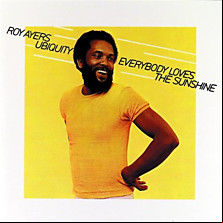BBC Review 1bj6o
Ayers’ mellow grooves infused with human sentiment are frequently irresistible.
Daryl Easlea 2010
By 1976, vibraphone legend Roy Ayers and his group Ubiquity’s music had become dirtier, funkier, and more repetitive. Yet it was still in turns mellow and soothing. The outfit were square pegs that refused to fit in any holes that suggested straightforward jazz, soul or disco.
Unbelievably, Everybody Loves the Sunshine was Roy Ayers’ 14th album, but it was the one that really struck a chord in the UK. Much of this was to do with its title-track, a woozy, off-kilter tribute to the summer. Piano dribbles out over lazy ARP synthesiser flourishes. As the tempo seems as enervated as the sweltering day the song describes, Ubiquity’s massed vocals joyously state the obvious: “Folks get down in the sunshine / Folks get brown in the sunshine / Everybody loves the sunshine.” Few records make you feel so pleasantly exhausted. The more conventional ballad Keep on Walking follows a similar groove; it can be seen as a direct influence on British funk ensembles such as Light of the World.
Elsewhere, the album is far from down-tempo. The opening Hey Uh-What You Say Come On is a chant over a driving rhythm with instrumental interludes. Keyboard player Philip Woo and guitarist Ronald “Head” Drayton play off each other, while John Solomon’s fluid, underrated bass holds it all together. It was an approach that Arthur Russell would later emulate as Dinosaur L, gaining the of the underground press.
Tracks such as The Golden Rod and The Third Eye, both vibes showcases for Ayers, border on the generic. The latter, with its cosmic overtones and talk of “secrets of numbers, secrets of sound”, chimes with the late 60s ‘Age of Aquarius’ atmosphere that still permeated in 1976. Although it doesn’t get too out there – the funky bossa nova of It Ain’t Your Sign, It’s Your Mind rails against those who took the whole horoscope thing too far.
Everybody Loves the Sunshine was much loved, and is one of the principal reasons Roy Ayers still visits the UK for a string of sold out concerts each year. His mellow, unconventional, jazzy and repetitive grooves, infused with human sentiment, are frequently irresistible.



